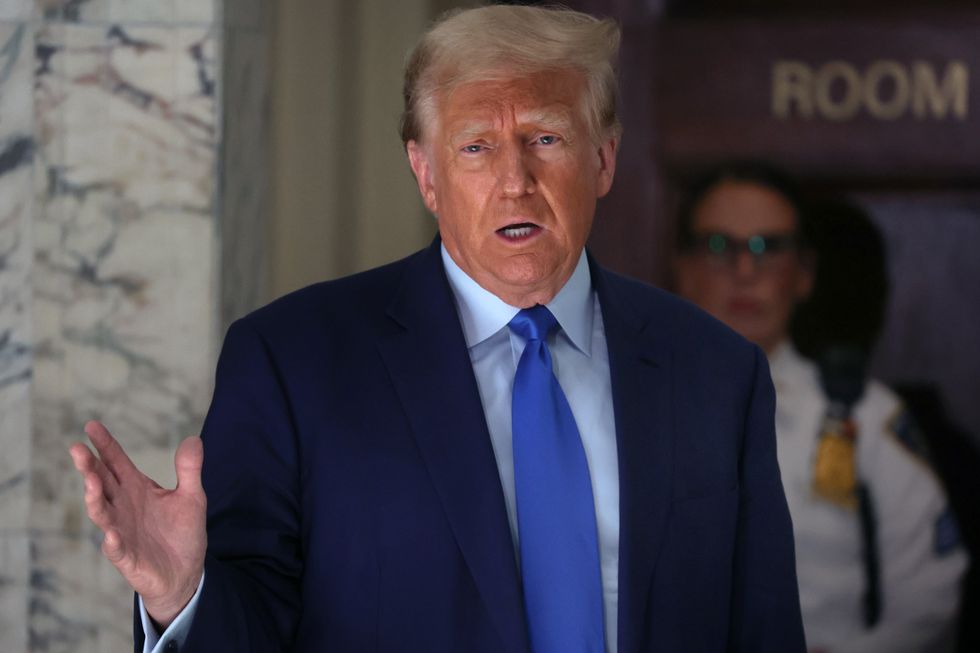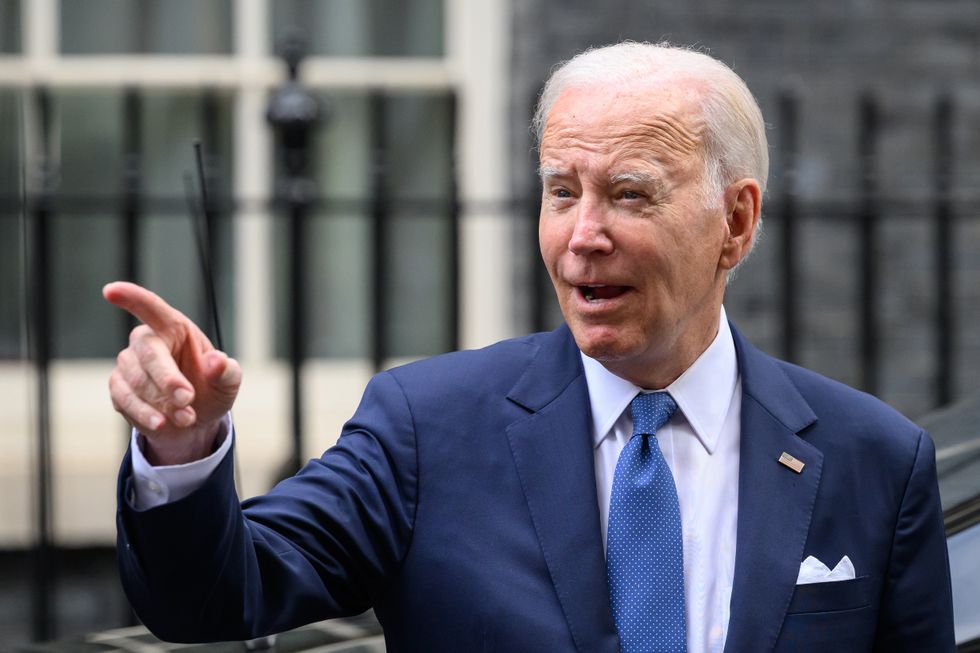How Trump and Biden's cognitive impairments are different — according to science
As the 2024 presidential election nears, two senior citizens are gearing up for mental marathons that will push them to their cognitive limits.
While both candidates have already earned nicknames for showing signs of mental decline, we must confront the uncomfortable question of whether either “dementia Donny” or “sleepy Joe” are fit for the job of commander-in-chief.
After all, with former President Donald Trump having just turned 78, and President Joe Biden at 81, they are the two oldest candidates to ever run for president, by far.
Were Trump to win and serve a full term, he’d be 82 years old on his final day in office — Jan. 20, 2029. In the same scenario, Biden would be 86 years old.
This question of whether either Biden or Trump are mentally up to the task of leading the free world deserves renewed interest after recent events, such as Biden’s fiery State of the Union speech, and a series of gaffes at Donald Trump rallies. The two men are scheduled to face off against each other on June 27 in a debate hosted by CNN.
And while more than a few articles have been written about the seeming cognitive decline of both candidates by well-known publications citing respectable sources, it is time to dig a little deeper, and inquire about what exact type of mental decline we are seeing in each, and to what degree.
Without medically valid, robust and transparent cognitive testing — neither Biden nor Trump have agreed to such a thing — it’s impossible to really know whether the signs of cognitive impairment we are witnessing in their public appearances are no cause for concern, or could actually have dangerous consequences due to their effects on decision making for a world leader of a superpower.
To answer these questions, we must rely on the next best thing: what experts are saying. This doesn’t mean talking heads on TV. Rather, where do professional psychologists and neuroscientists stand on the subject?
Let’s start with what we can safely say about both candidates, and that is that they are certainly experiencing cognitive decline. This is because it is natural and expected for any human who is in their 80s or nearing octogenarian status. In his article, “I’m a neuroscientist — our presidential candidates have shrinking prefrontal cortexes,” author Erik Hoel cites studies and data that shows it is clear that age-related cognitive decline typically starts in one’s 30s and essentially never stops.
At the beginning of this process of decline, it is basically impossible to see the signs without a series of specific memory tests and other mental examinations. But when you get up to the age range of our two presidential candidates, noticeable deficits such as verbal gaffes and obvious memory lapses become more frequent. While Hoel’s article does mention that there are what have been referred to as “super-agers” — individuals over 70 who show no signs of cognitive decline — it is safe to say through general observation over time that Biden and Trump don’t fall into that category.
The question of public interest: Are Biden and Trump experiencing standard cognitive decline, or are we seeing signs of dementia or some other troubling neurological disorder that would hinder a president’s ability to execute his duties? While cognitive decline is a natural part of aging, it is also a feature of dementia — a broad category of brain diseases that cause a long-term decrease in the ability to think and remember. Dementia can significantly impair a person's daily functioning.
According to Dr. John Gartner, a prominent psychologist and author — and critic of Donald Trump — the ex-president’s recent gaffes show something beyond your typical age-related cognitive decline. In contrast, Gartner argued that Biden is experiencing typical age-related cognitive decline but nothing more.
Gartner doesn’t mince words when it comes to the difference between the two candidates: “Biden’s brain is aging. Trump’s brain is dementing.”
Specifically, he cites Trump’s verbal behavior in his recent CPAC speech as being consistent with frontotemporal dementia with progressive aphasia. That means the physical integrity of the part of his brain associated with language is deteriorating in a way that leads to speech pathologies. What’s worse — this is not just an impairment with his ability to speak fluently and without slurs, but a sign of a deeper neurological impairment that is associated with general confusion.
Let’s review specific examples.
Gartner cites Trump’s frequent display of what is called a “phonemic paraphasia” — the substitution of a word with a nonword that preserves half of the intended word. Instead of “missiles” Trump might say “mishes,” and instead of “Christmas” Trump would similarly say “chrishis.” Essentially, Trump starts out with the correct stem of the word but is unable to complete it so he just garbles an ending. The Biden campaign has even attempted to score political points off Trump’s speech patterns, posting a video on X with the caption, “Trump slurs his words while ranting: In Mexico until [unintelligible].”
In his appearance on The David Pakman Show, Gartner tells Pakman that all of the experts he has talked to have said that nobody without brain damage commits these kinds of phonemic paraphasias.
As a neuroscientist myself, the question I’m mulling is whether Trump’s suspected brain damage is only in the area associated with speech production, known as Broca’s area, or also in the region associated with language comprehension, known as Wernicke’s area. The kind of paraphasia Trump is demonstrating, which does not involve a nonsensical pattern of words, is more likely to be a problem related to speech production, which is a less serious cognitive impairment.
The Trump-related gaffes that are much more concerning to me involve Trump confusing one person for another, in a way that is not just the result of a name slip, but an actual confusion of one person for another.
Trump’s former Republican rival Nikki Haley suggested Trump may be mentally unfit for holding office because — during a campaign speech in January — the former president seemed to repeatedly confuse her with former House Speaker Nancy Pelosi. Trump accused Haley of turning down security for the U.S. Capitol offered by his administration on Jan. 6, 2021, and then destroying “all of the information, all of the evidence.”
This example is perplexing because Haley and Pelosi are on opposite sides of the political spectrum and have little in common other than being female politicians. Most notably, Haley had no official role whatsoever during the events of Jan. 6, 2021.
This isn’t the first time Trump has mixed up two women with whom he’s quite familiar.
In Trump’s deposition during his civil rape case last year, he identified the supposed victim E. Jean Carroll as his ex-wife, Marla Maples. While this made headlines, the video posted by the Wall Street Journal does not show the photo Trump was looking at, so it’s impossible to judge whether the photo was simply blurry and ambiguous, as Trump claims.
What appears more worrisome is Trump confusing Biden for former President Barack Obama over and over again in different speeches. According to New York Magazine, it has occurred on at least seven different occasions. On March 2 during a rally in Richmond, Va., Trump said “Putin has so little respect for Obama that he’s starting to throw around the nuclear word.”
This slip would be minor if it weren’t for the fact that Obama hasn’t been president for almost eight years. Back in September, during a speech at the Pray Vote Stand summit in Washington, D.C., Trump appeared to boast that he beat Obama in 2016 and will do it again.
What makes things worse is that Trump has tried to explain these confusions as sarcasm or comedy, rather than blaming it on mental fatigue or something a little more understandable. This gives the impression that he’s trying to cover up cognitive impairment that is starting to become severe enough that it can’t be hidden from the public.
The last recent gaffe worth mentioning is one where Trump’s brain appeared to flat out stop functioning. As can be seen in this video, starting around the 2:10 mark, The Late Show host Stephen Colbert capitalized on this moment, saying:
“Donald Trump had two rallies this weekend — one in Virginia and one in North Carolina — but the two speeches had one unifying theme: His brain is broke. Here he is in Greensboro talking about how the U.S. doesn’t need to import oil from petro states.”
The clip of Trump then rolls, and he says something like, “We are a nation that just recently heard that Saudi Arabia and Russia will re-pi-tu, ahhh.”
He appears to have a cognitive glitch mid-sentence. Colbert then remarks, “Not entirely sure what’s going on there, but apparently he can’t say the word Russia without climaxing.”
So, what can we conclude from all these examples of verbal slippages and downright confusion?
It is obvious to me that Trump is cognitively impaired in a way that is not typical for even people as old as he. Then again, most 78-year-old men aren’t speaking regularly on a national campaign trail. To fairly compare Trump’s mental decline to Biden’s, we would need to see footage of Biden speaking for similar periods of time under similar pressure. Of course, we will never get to see that — Biden does not speak publicly nearly as much as Trump — but the State of the Union address did give us reason to think that Biden isn’t quite as cognitively impaired as much of the nation expected.
Additionally, a House committee hearing earlier this year corrected some misinformation put forth by special counsel Robert Hur that suggested Biden had forgotten the year his son died, which was used by right-wing news to further the claim that the president is mentally compromised.
My conclusion is that both presidential candidates are showing signs of cognitive impairment that could potentially develop into dementia down the line. A recent study at Columbia University found that 35 percent of individuals over 90 have clinical dementia, so it is quite common for those who are lucky enough to live that long.
What is of interest is the differences in the type of cognitive impairment we are seeing with the two candidates. While Biden’s mental and behavioral changes are more typical of aging — a gradual slowing of mental acuity and physical dexterity — Trump’s abnormalities are more like cognitive malfunctions. That being said, Trump’s mental state and the consequences for his decision making are more unpredictable, while Biden’s just put a big question mark over whether he can continue to do his job.
Perhaps the best thing for Democrats is for Biden to gracefully step aside and let a younger politician — Vice President Kamala Harris, California Gov. Gavin Newsom or Michigan Gov. Gretchen Whitmer, for example — who is mentally healthy and prepared to battle a cognitively impaired Trump. That way, there are no charges of hypocrisy, and voters could be presented with a candidate whose mental fortitude is as solid and reliable as their policy proposals. Unfortunately for Democrats, I don’t believe any of these people have a chance of winning.
But barring an acute health crisis, Biden — who, along with Trump just clinched enough delegates to become their respective parties’ nominees — shows no signs whatsoever of backing down or stepping away, no matter his limitations.
Bobby Azarian is a cognitive neuroscientist and the author of the book The Romance of Reality: How the Universe Organizes Itself to Create Life, Consciousness, and Cosmic Complexity. He is also a blogger for Psychology Today and the creator of the Substack Road to Omega. Follow him on Twitter and Instagram @BobbyAzarian.
- 'Gross signs of dementia': Medical experts troubled by Trump’s increasingly 'erratic' speeches ›
- Biden ‘fit to successfully execute’ presidential duties: White House doctor ›
- Economist Paul Krugman: 'Disgusting' obsession with Biden’s age ignores Trump’s 'incoherent' rambling ›
- Cognitive psychologist explains what actually matters when performing complex leadership jobs ›
- Biden's brain, Trump's brain — and this week's bombshell ›
- 'We can do better': Democratic delegates privately hope for any option other than Biden at DNC - Alternet.org ›
- Amid allegations of Biden’s decline, no one can point to one mistake - Alternet.org ›
- Author Stephen King says: 'It’s time' - Alternet.org ›
- 'Pleaded with him': Insiders describe begging Trump not to hit Biden with shocking slur - Alternet.org ›
- Poll analysis: Do Trump and Biden have the mental and cognitive ... ›
- As Biden's memory issues draw attention, neurologists weigh in ›
- Biden's memory is 'hazy' and 'poor,' says a special counsel's report ... ›
- Opinion: What a doctor sees when Joe Biden hesitates - Los ... ›
- Trump challenges Biden to cognitive test but confuses name of ... ›

 Supporters wait in line outside of the the Kellogg Arena to see U.S. President Donald Trump speak at his "Merry Christmas" rally being held at the Kellogg Arena on December 18, 2019 in Battle Creek, Mich. (Photo by Scott Olson/Getty Images)
Supporters wait in line outside of the the Kellogg Arena to see U.S. President Donald Trump speak at his "Merry Christmas" rally being held at the Kellogg Arena on December 18, 2019 in Battle Creek, Mich. (Photo by Scott Olson/Getty Images) A hat tops off a Christmas tree at a "Merry Christmas" rally hosted by U.S. President Donald Trump at the Kellogg Arena on December 18, 2019 in Battle Creek, Mich. (Photo by Scott Olson/Getty Images)
A hat tops off a Christmas tree at a "Merry Christmas" rally hosted by U.S. President Donald Trump at the Kellogg Arena on December 18, 2019 in Battle Creek, Mich. (Photo by Scott Olson/Getty Images) Former President Donald Trump speaks to the media during a break in his civil fraud trial at New York State Supreme Court on October 24, 2023 in New York City. Spencer Platt/Getty Images
Former President Donald Trump speaks to the media during a break in his civil fraud trial at New York State Supreme Court on October 24, 2023 in New York City. Spencer Platt/Getty Images A supporter of former President Donald Trump gather outside of the Fulton County Jail ahead of Trump's surrender on Aug. 24, 2023 in Atlanta, Ga. Jessica McGowan/Getty Images
A supporter of former President Donald Trump gather outside of the Fulton County Jail ahead of Trump's surrender on Aug. 24, 2023 in Atlanta, Ga. Jessica McGowan/Getty Images Then-President Donald Trump gestures to supporters following a campaign rally on October 28, 2020 in Bullhead City, Ariz. Isaac Brekken/Getty Images
Then-President Donald Trump gestures to supporters following a campaign rally on October 28, 2020 in Bullhead City, Ariz. Isaac Brekken/Getty Images President Joe Biden, pictured here leaving 10 Downing Street following a meeting with Britain's Prime Minister Rishi Sunak on July 10, 2023 in London, remains the overwhelming favorite to win the 2024 Democratic presidential nomination. Leon Neal/Getty Images
President Joe Biden, pictured here leaving 10 Downing Street following a meeting with Britain's Prime Minister Rishi Sunak on July 10, 2023 in London, remains the overwhelming favorite to win the 2024 Democratic presidential nomination. Leon Neal/Getty Images Robert F. Kennedy Jr. appears at the World Values Network's Presidential candidate series at the Glasshouse on July 25, 2023, in New York City. Michael M. Santiago/Getty Images
Robert F. Kennedy Jr. appears at the World Values Network's Presidential candidate series at the Glasshouse on July 25, 2023, in New York City. Michael M. Santiago/Getty Images Former President Donald Trump is currently leading all polls for the 2024 Republican presidential nomination and hurtling toward a general election rematch with President Joe Biden. Drew Angerer/Getty Images
Former President Donald Trump is currently leading all polls for the 2024 Republican presidential nomination and hurtling toward a general election rematch with President Joe Biden. Drew Angerer/Getty Images Then-President Donald Trump rallies with attendees at the 2019 Teen Student Action Summit hosted by Turning Point USA at the Marriott Marquis in Washington, D.C. Photo: Gage Skidmore
Then-President Donald Trump rallies with attendees at the 2019 Teen Student Action Summit hosted by Turning Point USA at the Marriott Marquis in Washington, D.C. Photo: Gage Skidmore